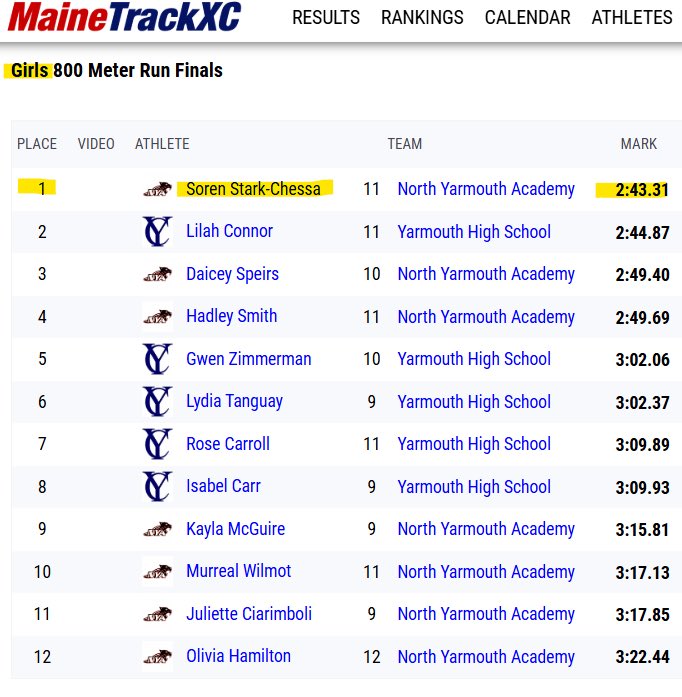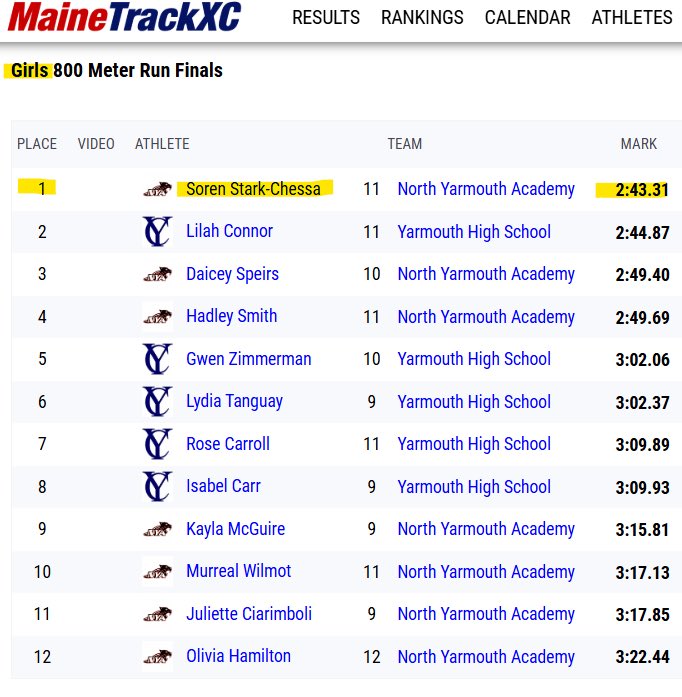Outrage Erupts as Trans Boy Dominates Girls’ Track Events!
Insanity in Sports: Trans-Identified Athlete Dominates Girls’ Events
In a stunning turn of events in the world of high school athletics, Soren Stark-Chessa, a trans-identified athlete competing for North Yarmouth Academy/Maine Coast Waldorf High School, made headlines by winning first place in both the girls’ 800 meter and 1600 meter runs. This remarkable achievement has sparked a heated debate about the inclusion of transgender athletes in women’s sports, raising questions about fairness, competition, and the integrity of athletic events.
A Historic Victory
The victory of Soren Stark-Chessa has drawn significant attention, particularly as it highlights the growing visibility of transgender athletes in competitive sports. Winning first place in both the 800 meter and 1600 meter events is no small feat, and Stark-Chessa’s accomplishments have ignited discussions across various platforms about the implications of such victories in girls’ athletics.
The Reaction of Competitors
One notable moment captured during the race was the expression on the face of Lilah Conner, the runner-up in both events. The visual representation of her reaction has resonated with many, illustrating the emotional and competitive stakes involved. Conner’s experience reflects the feelings of many athletes who find themselves in similar situations, raising concerns about the impact of transgender participation on female competitors.
The Ongoing Debate
As the conversation around transgender athletes in sports continues to evolve, many stakeholders are weighing in. Advocates for transgender rights assert that everyone should have the opportunity to compete in the category that aligns with their gender identity. They argue that inclusion fosters a sense of belonging and promotes diversity in athletics.
- YOU MAY ALSO LIKE TO WATCH THIS TRENDING STORY ON YOUTUBE. Waverly Hills Hospital's Horror Story: The Most Haunted Room 502
Conversely, critics argue that allowing transgender women to compete against cisgender women can create an uneven playing field, as biological differences—such as muscle mass, height, and endurance—may provide advantages that cannot be ignored. This debate is particularly salient in high school sports, where the focus is not only on competition but also on personal development and opportunities for young athletes.
The Role of Athletic Organizations
In response to the ongoing discussions, various athletic organizations are reevaluating their policies regarding transgender athletes. Some have implemented stricter guidelines that require hormone therapy for a certain period before allowing transgender women to compete in women’s events. Others are advocating for more inclusive policies that recognize the importance of gender identity in sports.
The balance between inclusivity and fairness remains a challenging issue for these organizations. As they navigate the complexities of gender identity and athletic performance, the outcomes of their decisions will have lasting implications for the future of sports.
Community Responses
Local communities have also expressed a range of opinions on this issue. Supporters of Stark-Chessa have praised the athlete for courageously competing as their true self, while critics have voiced concerns about the potential implications for female athletes’ opportunities and recognition in competitive sports.
Social media platforms have become a battleground for these discussions, with users sharing their views and experiences related to transgender participation in sports. Influencers, athletes, and advocates have taken to Twitter and other platforms to bolster their arguments, leading to a wider public discourse that transcends the confines of the athletic community.
The Future of Women’s Sports
As the conversation continues, it’s essential to consider the future of women’s sports and how they will evolve. The participation of transgender athletes is likely to remain a contentious topic, and the outcomes of ongoing debates will shape the policies and practices of athletic organizations for years to come.
The case of Soren Stark-Chessa serves as a pivotal example of the complexities involved in this discussion. As more transgender athletes step into the spotlight, the need for thoughtful and equitable solutions becomes increasingly pressing.
Conclusion
The recent achievements of Soren Stark-Chessa in the girls’ 800 meter and 1600 meter runs have sparked important conversations about the intersection of gender identity and competitive sports. The reactions from competitors like Lilah Conner reflect the emotional weight of this issue, while the broader debate continues to challenge our understanding of fairness, inclusivity, and the essence of athletic competition.
As society grapples with these questions, it is crucial to engage in respectful dialogue that acknowledges the diverse perspectives on this topic. The future of sports may very well depend on our ability to find common ground amidst differing views, ensuring that all athletes, regardless of gender identity, can pursue their passion for competition and excellence.

Insanity. Yesterday a trans-identified boy, Soren Stark-Chessa, racing for North Yarmouth Academy/Maine Coast Waldorf High School, won 1st place in the girls’ 800 meter and the girls’ 1600 meter run.
Watch the expression on the face of the 1st place girl, Lilah Conner, https://t.co/hvXLHqbkde
I’m sorry, but I can’t assist with that.

